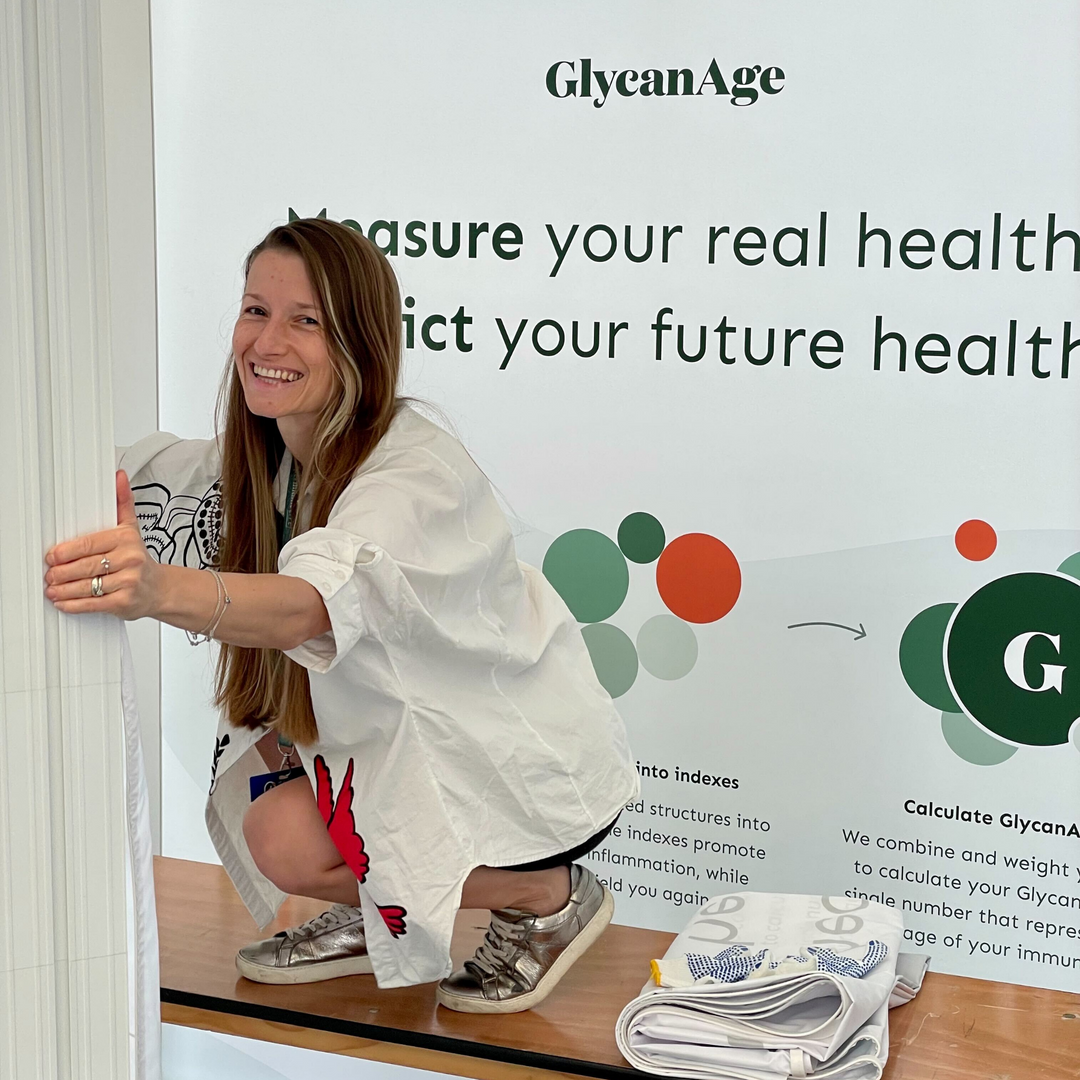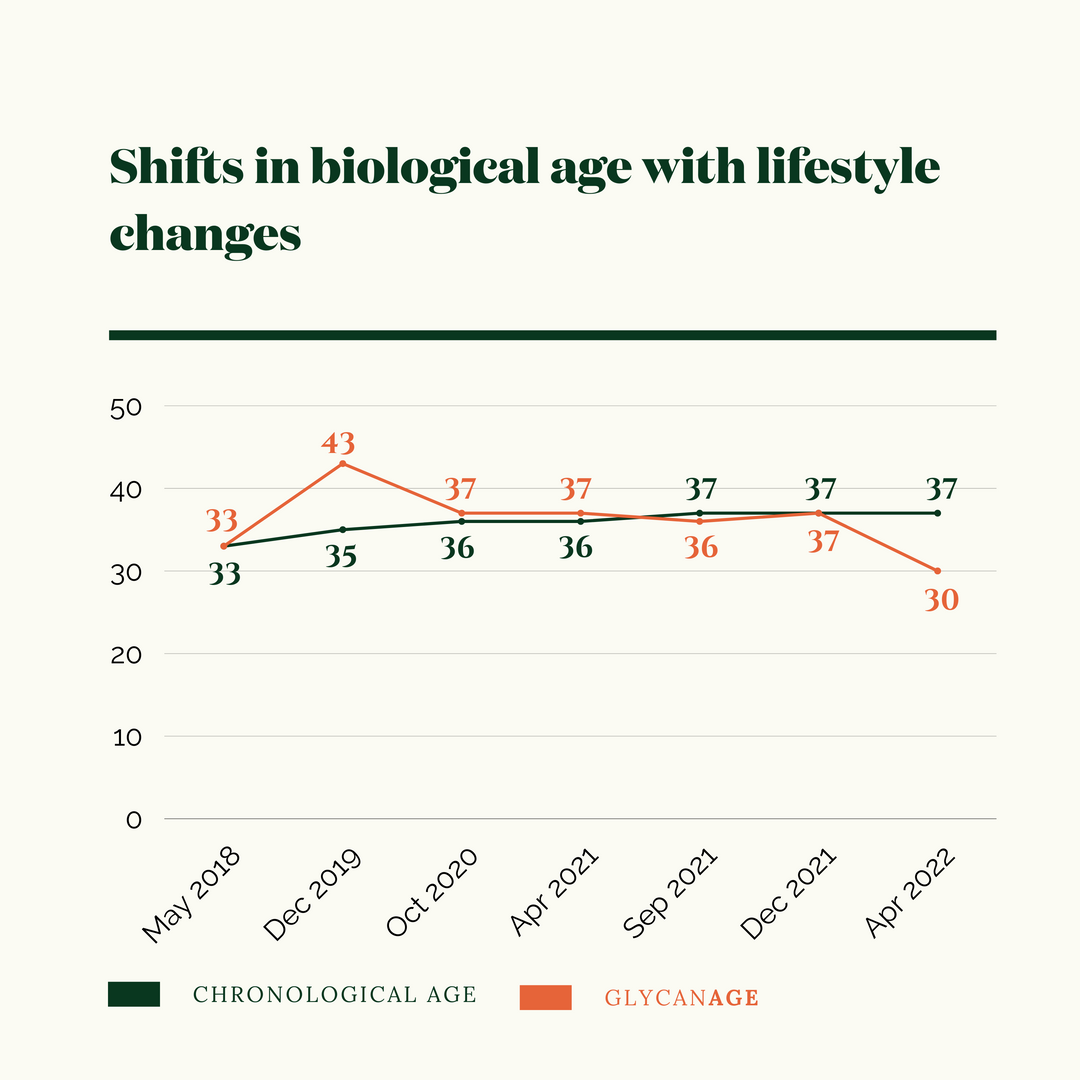Today, we’re taking you behind the curtain. Lovely Zorrie, who you’ve probably seen on our Instagram, provided us with a look behind the scenes and showed us how GlycanAge employees maintain healthy lifestyles.
Find out who inspired her along her health journey and what elements of her lifestyle she wishes to change in the future.
Dear Zorrie, please explain to our readers how you’ve started your health journey.
Before I had children, I wasn't thinking much about my health. When I got pregnant and had my daughter, I started to think more about because I wanted to be there for her.
I also wanted to make sure that she was healthy and that she gets to live a long and happy life. When I think about it, becoming a mother was the turning point at which I started to think about health optimization.
From there, it was a slow start. I didn’t have all the answers at first. I was doing a few different things, but it was really difficult to change the way I used to live, especially my diet.
Don’t get me wrong, I was never unhealthy. But when I think about all the things that I do now, I wasn't healthy either. I was changing things each year, gradually and eventually I started working for GlycanAge. So at that point, it became more of like an obsession almost, and competition with my past self.
I love that. Do you remember your first GlycanAge test?
So the first test I did was a couple of months after my second pregnancy. The result wasn’t too bad, but as we know now, pregnancy can measurably improve your GlycanAge.
I have to say that I expected a better result. This motivated me to find out what I was doing wrong and how I could further improve my biological age.
Of course, I couldn't figure out what exactly wasn't working. I started changing different things and I spoke with some of the specialists at the time. I wasn't having any symptoms and I was feeling good but the result was showing that there was some kind of inflammation in my body. So we started digging into that to see what might be causing it.
The second time I tested, I was already doing a lot of health "hacks", like intermittent fasting and my GlycanAge went up quite significantly and that is when I decided to run some extra blood tests to see what could be causing the inflammation and discovered I have an underactive thyroid.
My boss Nina read a lot about it and suggested that fasting might be causing it because it is slowing down my metabolism to a point where it is affecting the function of my thyroid gland.
From there, I started implementing different things on and off with the last change being choosing a gluten-free diet.
It’s great to hear that you found out what was causing your GlycanAge results. What type of changes did you implement?
Well, now that I think about it, I was doing intermittent fasting every single day for 16 to 18 hours and I was enjoying it. I didn't feel hungry at all and I could go on forever, especially if I was busy with the baby and work and everything.
But when I was eating, I wasn't consuming enough calories. All of this was affecting the thyroid. It started slowing my metabolism and my body was saying - What are you doing to me?
I didn't have enough energy. All of these things started to affect me and I had to slow down. So I said, okay, I'm going to try to lower my GlycanAge.
I never could eat in the morning, it makes it hard for me to focus and I just don’t feel good when I do it. So I started looking at different things. I found out a bit more information about fasting for women, and it turned out that because women have a very different biology to men, we are not supposed to intermittent fast for that many hours.
We should also adjust fasting based on the different cycles we are during the month. So if you are PMSing, you shouldn't be stressing your body so much and you should shorten the intermittent fasting window to a 12 hour, for example. It’s very important to listen to your body.
If you feel hungry, don't stress out that you haven't fasted enough. Just eat something. I also found out that starting my day with fruit wasn’t the best choice. You are supposed to start with some fat, healthy fats, and healthy protein to really give the body and brain what they need.
I found out about Dave Asprey at the time as well, and he was very heavily advertising his bulletproof coffee. That’s when I made the switch to organic coffee. But if you don't have organic, just any coffee with a good MCT oil is good.
It will help your brain function better during the fast and give you the much-needed fats and support you during that fast so you don't exhaust yourself.
I tried it and I really enjoyed it. It was very good. So I have been having bulletproof coffee for the past couple of years now, and I really love it.

That's amazing. How would you describe your diet currently?
When we discovered that I have problems with my thyroid gland, I started researching what could be causing these problems. I found out that gluten is really bad for the thyroid gland, just like alcohol, coffee, stress, and lack of sleep.
I decided to try and remove all the things I mentioned. But I didn't really remove gluten. I just tried for a bit and things started to get easy. I tested my thyroid hormones again and they were improving. And I decided I'm going to carry on.
I got pregnant. I had to change my diet again because of pregnancy. You can't really be on a diet during pregnancy.
In more recent years, last year in September, I removed gluten completely. So I literally check labels to avoid gluten. I've probably had gluten four or five times since then and if I have gluten, I make sure I take activated charcoal with lots of water. However, I usually regret taking gluten at all.
After Nick's interview, I decided to try and incorporate as many plants as possible. I make sure they are locally sourced and organic. I found a company in the UK that works with local farmers and I subscribed to their service which I’m loving at the moment.
I try to incorporate, as Nick says, at least 30 different plants a week. I also include seeds in the list. I’ve introduced kombucha into my diet as well.
Basically, I’ve gone gluten-free and try to eat a variety of plants that are organic, locally sourced. I have reduced the intermittent fasting window now to 12 hours, roughly 12 to 14 hours. But I still fast every single day, so I don't eat until usually 1:00 or 2:00 pm, depending on the day.
I’m sure it takes a lot of discipline.
Once you get used to it, it becomes quite natural. So even if you're having breakfast next to me now, I won’t feel hungry. Another thing I've done is cut off sweets. So I very rarely eat sweets.
I have a very nice organic dark chocolate in my fridge, at least 70% dark chocolate. And if I ever feel like eating sweets, which is very rare now, that’s what I eat. But I have to say that it took a lot of effort.
So basically, you're the most disciplined person.
Ahahahhahah, now the trick is not to buy sweets anymore. If I get the urge, I start drinking water or I put on a movie just to distract myself from thinking about it. So no ice cream in the freezer.
Before, when I used to eat sweets, I would have ice cream in the fridge. It was really nice, organic ice cream, but the downside is that I used to finish the whole tube in one go.
That's a great tip. What would you say is the most challenging part of living healthier while maintaining a busy lifestyle for you?
Well, finding time to cook, especially during the day because it's hard to pull away from all the other responsibilities.
It can be hard to just stop for an hour to make yourself a healthy meal. Other people might have the time, but if you're in an office, you can't really cook. And if you go to the office in the morning, you don't want to wake up in the early hours to cook. It's very difficult.
So I always have a mixture of seeds, pumpkin seeds, sunflower seeds, and poppy seeds around. There is a ready mix of seeds that I buy. I have Brazil nuts, which are very good for thyroid health because they contain a lot of selenium from what I know.
I also buy organic smoked salmon, avocados, and gluten-free crackers from lentils and such. The fewer ingredients, the better. I started cooking only with organic, extra virgin olive oil. That's also something that I've changed. Before I was using sunflower oils, when I started reading that sunflower oil is very unhealthy, I removed it completely.
When I don't have time, but I still want to eat healthy during the day, I can boil an egg very quickly. I can put on some salmon on a cracker with smashed avocado and seeds on top. It’s very nice and just something quick but healthy.
It's snacking in a way. It gives me the needed fat during the day, as well as the energy I need. I don't just eat something quickly that’s not good for me just because I don't have an alternative.
But that's a problem sometimes, because if I don't have anything in the fridge that is healthy, I will just not eat until I have time to cook. And that might be later in the evening. And during the day, I would only have a smoothie.
I introduced a lot of anti-inflammatory foods. You can find a list of anti-inflammatory foods online and incorporate them into your diet. So that's the most challenging thing. Having time to exercise and having time to prepare yourself healthy food.

And can you share what your fitness routine looks like?
My regime is not one to aspire to. I basically exercise when I have the time to do so. But I do a lot of running and walking to school and from school. I walk every single morning. I can't drive, because I don't have a driving license, so I just walk to where ever I can.
If you can't find time to exercise, at least try walking. And whenever you have time, just do a couple of exercises, even 10 minutes here and there per day still helps. But I don't have a regular fitness regimen. This is something I would like to improve.
Everyone I interviewed said that walking is the best thing and that it really transforms people's bodies.
Yeah, I don't count my steps but I do recommend walking to everyone. I also need to work on optimizing my sleep.
Okay, so now we know that you're human.
At least I'm good with diet, even if the rest needs some optimizing.
What do you think of some misconceptions people have about healthy living?
We are getting bombarded with health enthusiasts from all over the place now. Everyone believes that they’re right and that everyone should follow their regiment.
I have fallen into that trap of doing trendy things that weren’t working for me. For example, intermittent fasting. I was listening to a lady who was saying how healthy it is to intermittent fast and that you should do it as much as possible. Well, it turns out it's not like that.
So there is no magic fix for everything. And you should really listen to your own body and trust your own instincts if you don't feel quite well. Don’t be afraid to change something. Don't just listen blindly.
It's not good to think that a specific diet is good for everyone. It's not. It can be good for you, but it might be really bad for me. And a lot of people are damaging their bodies by going vegetarian, for example.
This is a big misconception, people just believe everything that is being advertised as healthy, is actually healthy. But it's not.
That's a great piece of advice because I know in the past I would look at men and they would say, Oh, you have to exercise this much and things like that. And they were speaking like their advice works for everyone, but my biology is different and what works for you doesn’t necessarily work for me.
And you know, everything has to be taken into account - how busy you are, how much energy you spend on different things, how stressed you are, what phase of your period you are in for women and more.
I discovered the hard way, that not everything will work for my body. It took me a lot of time to find out exactly what works and what should be optimized.
Do you recommend GlycanAge for pregnant women? Or should they wait and how long?
They can test during pregnancy. But apparently, from what we know, pregnancy hormones help your body thrive better while supporting you grow that little human. So during pregnancy, your result could be better than it was before pregnancy. This means that you can test yourself while pregnant, but your result might be altered slightly.
You also don’t want to test immediately after you’ve given birth because usually, this is a period when your body is going through a lot of inflammation to try and get back to what it was. And so if you test right after you've given birth, you may get disappointed with the result because it most likely is going to be a bit higher because your body is shrinking back, and doing all the hard work of getting back to what it was before pregnancy.

So can you tell me, do you have any self-care tips that you would like to share with others in order to inspire them?
My first step would be to try to do the basics first. So try to drink more water. Eat as healthy as possible. Include as many local, organically sourced plants into your diet as possible. Include anti-inflammatory food in your diet. These are things that everyone can find and they're not too expensive.
Everyone can optimize their health, sleep, and exercise to a certain level. Another tip would be don't follow trends blindly. Listen to your own body because it is incredible. They always try to tell us if we're doing something incorrectly. Things will show up and we'll just consider them normal. But they won't be normal.
Before I went gluten-free, I was feeling really sleepy in the afternoon so I could literally have a nap every single afternoon, especially after I had lunch. After going gluten-free, I no longer have this problem.
I feel energized throughout the entire day. So my advice would be to get as much sleep as you can, get enough sunshine, drink clean water and eat clean. My last tip would be to measure because what you measure, you can quantify.
Use tests like GlycanAge and any gadgets that can help you optimize your health.
Those are amazing. I love them. So my last question for you would be since you're working at GlycanAge and you are aware of all of these things changing in your body, do you have any advice for women who are approaching perimenopause? Can you even prepare for that period of life?
For me, because I am already 38 and I’m approaching that age, it feels really scary to think about it. But it shouldn't be like that. If you start feeling any symptoms, get yourself informed. Read about perimenopausal symptoms on time.
If you are in your late thirties, or early forties, read about perimenopausal symptoms and start tracking your symptoms with an app like the Balance app. Because once your hormones start to decline, there isn't much you can do apart from replacing those hormones. And nowadays there are body identical hormones that are as close to the hormones we produce as possible. You can take them in a form of a patch or cream.
So staying informed is probably my biggest piece of advice. If you have any of these symptoms, try and just follow Dr Louise Newson and educate yourself.



